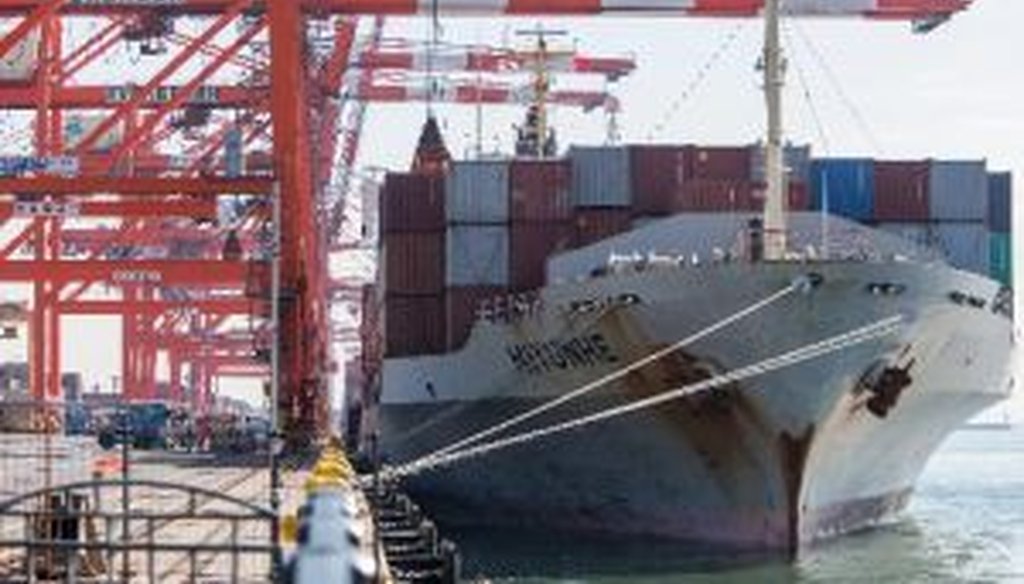Stand up for the facts!
Our only agenda is to publish the truth so you can be an informed participant in democracy.
We need your help.
I would like to contribute

A container ship awaits being unloaded in a cargo terminal at a port in Tokyo in November 2013.
With the public and the media these days focusing on Obamacare and a nuclear agreement with Iran, a major proposed trade deal known as the Trans-Pacific Partnership hasn’t received much attention. But a reader recently sent us a chain email about it, so we decided to take a closer look at the international agreement that’s being negotiated.
The Trans-Pacific Partnership would set ground rules for trade between a dozen nations in the Pacific region. It’s been in negotiation for several years among the United States, Australia, Brunei, Canada, Chile, Japan, Malaysia, Mexico, New Zealand, Peru, Singapore and Vietnam. These countries account for roughly 40 percent of the world’s economy.
Trade deals often draw opposition from the left (due to such concerns as labor rights, environmental protection and an expansion of corporate power) and sometimes from the right (such as over a feared loss of national sovereignty). This has been true with the Trans-Pacific Partnership as well, with various proposed provisions involving everything from pharmaceutical patents to rights for legal redress drawing fire.
In our fact-check, we looked at how the agreement -- if a deal is ultimately struck -- would be enacted by Congress.
The chain email we received, which originated with a Henderson, Nev.-based "online outreach Christian church and ministry" called Pray for US, said, among other things, that "if this treaty is fast-tracked through the Senate, it won't receive a committee assignment and it will be subjected to a straight up-or-down vote, with no debate."
It’s true that such measures are considered in Congress under expedited rules. Lawmakers must consider the original text of the trade agreement’s implementing legislation and may not make any amendments. In addition, the measure would need 50 percent plus one to pass -- not the common Senate supermajority of 60 votes.
However, the email is simply wrong to claim that legislation stemming from a trade agreement "won't receive a committee assignment" and that the agreement will have "no debate." Both are explicitly provided for in the rules. So we rated the claim False.
We also looked into a second claim from the email -- that "only the Senate is allowed to negotiate trade agreements under the Constitution." If accurate, this would mean that anything stemming from the current Trans-Pacific Partnership negotiations would be invalid, since they are being negotiated by the executive branch, not by Congress.
We decided that the answer to this question ultimately depends on judicial interpretations of the Constitution, so we didn’t put it to the Truth-O-Meter. However, we did ask some constitutional and congressional experts about it, and we’ll offer their thoughts here.
The notion that "only the Senate is allowed to negotiate trade agreements under the Constitution" appears to stem from Article 1, Section 8, which reads: "The Congress shall have the Power To ... regulate Commerce with foreign Nations."
The experts we asked acknowledged that this gives the claim some plausibility, but they added that such a reading was incomplete.
Just because the Constitution says Congress may have "the power to ... regulate commerce with foreign nations," the experts said, doesn’t mean that the president is barred from negotiating trade agreements. Rather, it’s fair to say that "authority over foreign trade is shared between the branches," said Sarah Binder, a congressional scholar at the Brookings Institution.
"The suggestion that because Congress has the power to do something unilaterally, the president can’t seek to enter multilateral agreements on related topics makes no sense to me," said Kermit Roosevelt, a University of Pennsylvania law professor. "The Constitution, after all, specifically gives the president the power to make treaties, subject to Senate approval, and the Supreme Court has long endorsed executive agreements without congressional approval."
In fact, even beyond the question of what the Constitution says, Congress has acted on its own -- consistently and explicitly -- to enable presidents to negotiate trade deals.
"Congress has long delegated its authority to set tariffs to the president, first in the Reciprocal Trade Act Agreement of 1934 and again in the now-binding Trade Act of 1974," said Emily Blanchard, an assistant professor at the Tuck School of Business at Dartmouth College.
While there’s "been some academic debate about this," added Ilya Shapiro, a senior fellow in constitutional studies at the libertarian Cato Institute, "it’s Congress that’s simply binding itself" by repeated passage of laws that empower the president to negotiate trade agreements.
Our Sources
Pray for US, "Top Secret Trade Deal Destroys America's Borders & Jobs - Stop The Trans-Pacific Partnership!" accessed Nov. 26, 2013
Pray for US, "Obama to be King – If We Let Him!" accessed Nov. 26, 2013
Congressional Research Service, "Trade Promotion Authority (TPA) and the Role of Congress in Trade Policy," Aug. 2, 2013
Text of the Constitution of the United States
Mireya Solís, "Would the Proposed Trans-Pacific Partnership be Good or Bad for America?" Nov. 6, 2013
The Guardian, "The Trans-Pacific Partnership treaty is the complete opposite of 'free trade,'" Nov. 19, 2013
Office of the United States Trade Representative, "The United States in the Trans-Pacific Partnership," accessed Nov. 25, 2013
Email interview with Sarah Binder, congressional scholar at the Brookings Institution, Nov. 18, 2013
Email interview with Kermit Roosevelt, law professor at the University of Pennsylvania, Nov. 18, 2013
Email interview with Ilya Shapiro, senior fellow in constitutional studies at the Cato Institute, Nov. 18. 2013
Email interview with Steven Smith, political scientist at Washington University in St. Louis, Nov. 18, 2013
Email interview with Emily Blanchard, assistant professor at the Tuck School of Business at Dartmouth College, Nov. 18, 2013














































